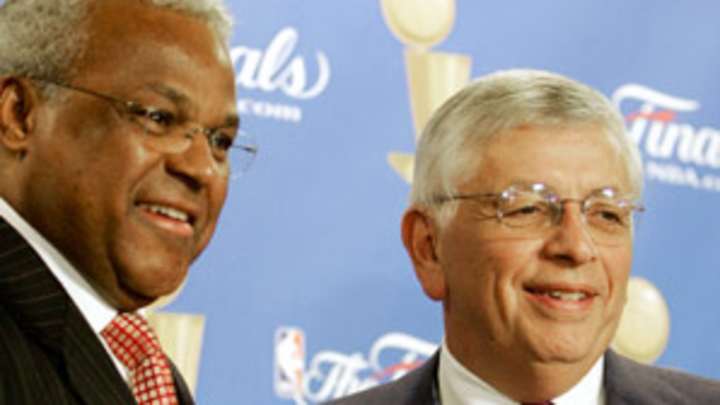NBA players plead to block lockout, but swift response unlikely

The NBA players' union has made the first move in what will likely be a long legal chess match played out in mediation rooms and courthouses. Earlier today, the union filed an unfair labor practices charge with the National Labor Relations Board (NLRB), asserting that the NBA refuses to bargain in good faith. The union intends to prove that the league has made a series of demands -- such as reductions in guaranteed player contracts and a hard salary cap -- which it knows the players will reject.
In the union's view, the league's true ambition is to commence a lockout as soon as July 1, which is the day after the current collective bargaining agreement is set to expire. A lockout would enable NBA teams to avoid paying their players' salaries and other contractual benefits. A lockout could also incite divisions among players whom, depending on their extent of savings and other sources of income, could hold varying views about whether to concede or fight. The union also contends that the league has not provided sufficient financial materials to support its economic claims and has attempted to bypass the union to negotiate directly with the players.
• Players' association files unfair labor charge against NBA
The NBA characterizes the charge as baseless and untrue. In a forthcoming response to the NLRB, the league will likely highlight recent comments by its top officials, such as deputy commissioner Adam Silver, which strike a conciliatory tone and which emphasize that neither side will win if games are missed. The league will also try and stress how it has provided the union with detailed financial records and that the requested demands of players, who reportedly earn an average of about $5 million a season, are necessary for the league to remain economically viable. To corroborate its claims of financial difficulty, the league recently announced that 22 of 30 teams will lose money in the 2010-11 NBA season, even though the season has clearly been "successful" in terms of TV ratings, attendance and quality of play; as a point of contrast, not one NFL team has shown that it lost money in the 2010 season.
Although the players' union has urged the NLRB to "investigate this matter quickly" and to provide injunctive relief -- namely an order that would temporarily block the NBA from commencing a lockout on July 1 -- such a swift response appears unlikely. The NLRB normally takes 30 to 90 days to investigate a charge. Given the complexity of the facts and the infrequency of charges concerning professional sports leagues, the NLRB may take even longer here. Keep in mind, the agency is still investigating the unfair labor practices charge filed by the NFL on February 14.
Still, there exists the possibility of the NLRB conducting an expedited and preliminary review of the union's charge and determining that temporary injunctive relief would be necessary to protect the players' rights under labor law. In that scenario, the NLRB could then seek an injunction in a federal district court. If granted, the injunction would last as long as the agency needs to more thoroughly review the charge and, more importantly, would prevent the NBA from conducting a lockout during that review time. If, at the conclusion of the review, the NLRB determines that the charge is meritorious, it would then issue a complaint against the NBA and try to work out a settlement. If a settlement cannot be reached, a trial would be held and verdict from the trial could be appealed. The entire timeline could take a year or more and not end until possibly after a 2011-12 NBA season will have been played or cancelled.
Tactically, the NBA players' union may have learned from its NFL counterparts' struggles before the U.S. Court of Appeals for the Eighth Circuit. The NBA players' union may believe that its legal claims would fare better before the NLRB than they would before federal judges, even federal judges who preside over a different federal circuit than the Eight Circuit. As a result, the players' union may be trying to accelerate the NLRB's review process and to put the league on the defensive.
The NBA players' union is also in a different situation than the NFLPA, which by virtue of its collective bargaining agreement with the NFL, had to decertify before the CBA expired in March or wait until September to do so. By decertifying, a players' union can bring antitrust claims against the league and more readily get courts involved. The NBA players' union is not under the same pressure to decertify and thus may prefer to first seek redress before the NLRB.

Michael McCann is a legal analyst and writer for Sports Illustrated and the founding director of the Sports and Entertainment Law Institute (SELI) at the University of New Hampshire School of Law, where he is also a tenured professor of law.